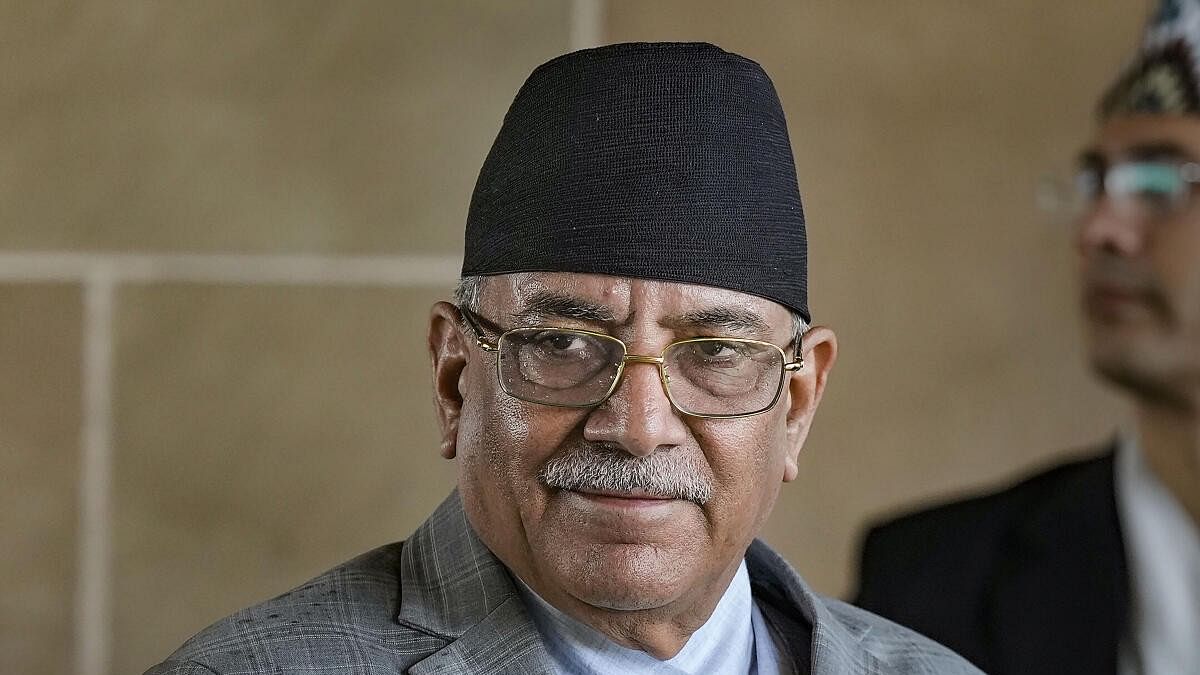
Nepal Prime Minister Pushpa Kamal Dahal 'Prachanda'.
Credit: PTI Photo
Nepal’s politics has once again taken an unexpected turn with Prime Minister Pushpa Kamal Dahal, aka Prachanda, breaking his alliance with the Nepali Congress. Prachanda’s Communist Party of Nepal (Maoist Centre) formed an alliance government with the Communist Party of Nepal – United Marxist Leninist (UML), which is led by K P Sharma Oli.
With this, the alliance between CPN (Maoist Centre) and the Sher Bahadur Deuba-led Nepali Congress, formed in December 2022, has ended. Overnight 32 MPs from the CPN(Maoist Centre) formed a new coalition with the 78 MPs of the CPN-UML, 21 MPs of the Rashtriya Swatantra Party, and 12 MPs of the Janata Samajvadi Party — giving him 138 seats in a house of 275. Prachanda is further trying to bolster his majority by bringing Madhav Nepal’s CPN (Unified Socialist) into the fold.
Refusing to recognise the ground reality of Nepal politics, some Indian observers have opted for the easy explanation that the ‘left unity’ between the CPN-UML and CPN (Maoist Centre) is the handiwork of China. India has been blind-sided by China so often of late in Nepal that the ‘Chinese influence’ has become a go-to explanation for any political changes that may not be of India’s liking.
However, Prachanda’s actions have more to do with the attitude of the Nepali Congress than efforts by China. The December 2022 alliance between Prachanda, Deuba, and Madhav Nepal was based on rotational prime ministership. Prachanda and Deuba were to get two years each as prime minister, and with the remaining year going to Madhav Nepal. India apparently provided the tacit guarantee that Prachanda would not be disturbed by Deuba for the first two years.
The immediate reasons for Prachanda breaking the alliance just 15 months later were provided by his Nepali Congress-nominated finance minister Prakash Sharan Mahat. Mahat was constantly at loggerheads with Prachanda. Requests to Deuba to nominate someone else from the Nepali Congress for the job fell on deaf ears.
Mahat has never contested an election, and comes from the proportional representation quota of the Nepali Congress in Parliament. He has enjoyed several high offices, including being a former energy minister and foreign minister. His strength comes from the Deuba family, especially Arzu Rana Deuba.
Arzu Rana Deuba, the wife of Sher Bahadur Deuba, is also Member of Parliament under the Nepali Congress’ proportional representation quota, and nurtures political ambitions. Sher Bahadur Deuba’s opponents in the Nepali Congress suspect that he would like his wife to succeed him as party president. One of the reasons for Prachanda’s unhappiness in running the coalition was what he saw as Arzu Rana Deuba’s undue interference in governance through her party’s ministers, like Mahat. The ambitious Sher Bahadur Deuba himself acted as a super prime minister drastically constraining Prachanda’s degrees of freedom as Prime Minister.
The differences also came to the fore over Sher Bahadur Deuba’s desire to have party member Krishna Sitaula appointed as Chairman of the National Assembly. However, Prachanda wanted his party to get the job.
Sher Bahadur Deuba was also perceived as trying to cut the Maoists down to size by supporting some members of Nepali Congress Central Committee who launched a signature campaign to restore Nepal as a Hindu Rashtra (Hindu nation). Last month, 42 members of the central committee demanded through a signature campaign that the party support the restoration of Nepal as a Vedic Sanatan Hindu Rashtra. The man leading the campaign, Shankar Bhandari, claimed that the demand had the support of Sher Bahadur Deuba.
The central committee in its meeting on February 16 refused to put the issue on its agenda. Bhandari, the campaign leader, told the media that while some Nepali Congress leaders have questioned the intention of the signatories, “we think we also have a responsibility to the state and the nation.”
This is the second time that such a signature campaign has been used by Nepali Congress members to force a discussion and support the restoration of Hindu Rashtra. They had done so unsuccessfully in 2018 as well.
It is significant that the demand which was earlier limited to political parties that were royalist vestiges is being adopted by one of the largest mainstream parties in Nepal which was at the forefront of creating the republic. In its royalist origins, the demand for Hindu Rastra envisioned restoration of a symbolic Hindu monarch in the country. As under the current Constitution, Nepal is republican and secular, both demands do not seem realistic.
But if the Constitution is changed, the Maoists are threatened, as transitional justice was one of the four pillars of the peace accord which brought them into the democratic process. The other three were, promulgation of a Republican Constitution, State restructuring and integration of Maoists combatants into the Nepal Army. There are hundreds of legal cases against the Maoist cadre which are in abeyance as of now as the State tries to seek some kind of peace and stability through various reconciliation processes. Sher Bahadur Deuba’s tacit support, if the claims of the revivalists are correct, threatened the Maoists existentially.
There is strong suspicion in Nepal that the revivalist demand for abandoning secularism and restoring Nepal as a Hindu Rashtra is being encouraged by the Hindutva forces in India. Indeed, many Nepalese political observers claim that ‘Indian interests’ in Nepal are being overtaken by ‘Hindutva interests’.
This may be the reason why India often gets blind-sided in political developments in Nepal — as the Indian State and the ideological forces of Hindutva working there are often at cross-purposes in the Himalayan nation. Ambitious political elements in Nepal desirous of being in the good books of the ruling dispensation in New Delhi are only too eager to please.
Bharat Bhushan is a Delhi-based journalist.
(Disclaimer: The views expressed above are the author's own. They do not necessarily reflect the views of DH.)